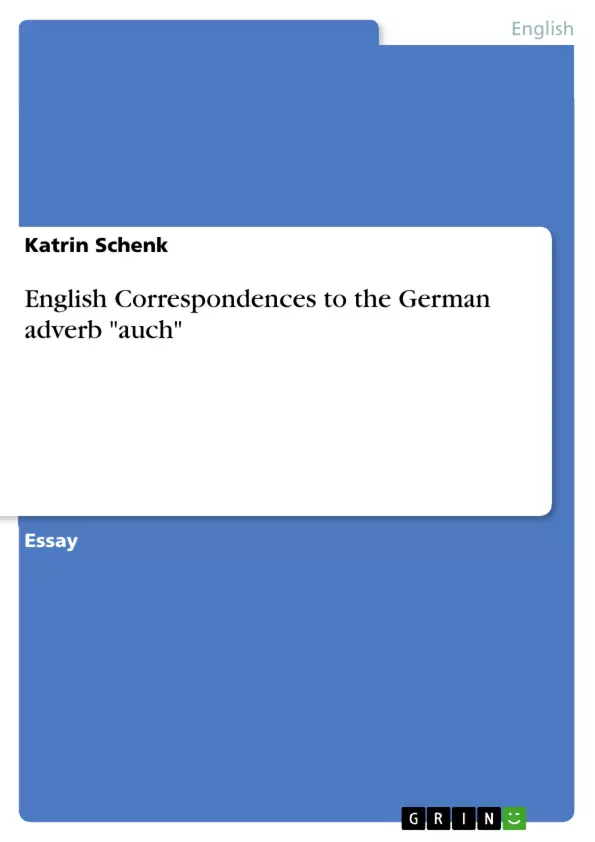This essay describes the English correspondences to the German adverb „auch“ about two pages.
Table of Contents
- English correspondences to the German adverb „auch“
Objectives and Key Themes
This text aims to analyze the structural differences between English and German, focusing specifically on the adverb "auch" in German and its English counterparts ("too," "as well," "also"). The analysis investigates the impact of word order and focus on the meaning and interpretation of sentences containing these adverbs.
- Comparison of German "auch" and its English equivalents
- The role of word order in determining meaning
- The influence of focus on sentence interpretation
- Ambiguity in English vs. unambiguous sentences in German
- The phenomenon of scrambling in German
Chapter Summaries
English correspondences to the German adverb „auch“: This chapter compares the usage of the German adverb "auch" with its English equivalents: "too," "as well," and "also." It highlights the fixed word order of "too" and "as well" at the end of sentences in English, contrasting this with the flexibility of "also," which can precede the main verb or appear between the auxiliary and main verb. The chapter then explores the ambiguity inherent in English sentences using these adverbs, demonstrating how focus on different words can lead to multiple interpretations concerning either the person or the location. This ambiguity is directly contrasted with the consistent and unambiguous interpretation of sentences with "auch" in German, due to the freedom of word order allowed by scrambling, which determines the focus and resulting meaning.
Keywords
German adverb "auch," English adverbs "too," "as well," "also," word order, focus, ambiguity, sentence interpretation, scrambling, German syntax, English syntax, comparative linguistics.
English Correspondences to the German Adverb “auch”: A Comparative Linguistic Analysis - FAQ
What is the main focus of this text?
This text analyzes the structural differences between English and German, specifically focusing on the German adverb "auch" and its English counterparts ("too," "as well," "also"). It investigates how word order and focus influence the meaning and interpretation of sentences containing these adverbs.
What are the key themes explored in this analysis?
The key themes include a comparison of "auch" and its English equivalents, the role of word order in determining meaning, the influence of focus on sentence interpretation, the presence of ambiguity in English versus unambiguous sentences in German, and the phenomenon of scrambling in German.
How does the text compare the use of "auch" with its English equivalents?
The text compares the usage of "auch" with "too," "as well," and "also," highlighting the fixed word order of "too" and "as well" at the sentence's end in English. This contrasts with the flexibility of "also" and the consistent, unambiguous interpretation of sentences with "auch" in German due to word order flexibility (scrambling).
What role does word order play in the interpretation of sentences with these adverbs?
Word order is crucial. The fixed position of "too" and "as well" in English limits interpretation, while the flexible word order in German sentences with "auch," enabled by scrambling, allows for nuanced focus and meaning.
How does focus influence the meaning of sentences with these adverbs?
Focus significantly impacts meaning, especially in English. Different word focuses in English sentences with "too," "as well," or "also" can lead to multiple interpretations. In contrast, scrambling in German with "auch" determines focus, resulting in unambiguous interpretations.
What is the significance of ambiguity in English versus the lack thereof in German sentences?
The text highlights the inherent ambiguity in English sentences using "too," "as well," or "also," demonstrating how different word focuses create multiple interpretations. This contrasts sharply with the unambiguous nature of German sentences with "auch" due to the clarifying effect of scrambling.
What is "scrambling" in the context of this analysis?
Scrambling refers to the flexible word order allowed in German sentences. This flexibility allows the speaker to place emphasis on different parts of the sentence, thus controlling the focus and clarifying the meaning, which contrasts with the fixed word order restrictions in English.
What are the key takeaways from the chapter summaries?
The key takeaway is the significant difference in the flexibility and resulting clarity between the use of "auch" in German and its English counterparts. The fixed word order restrictions in English lead to ambiguity, while the free word order in German allows for precise and unambiguous communication.
What are the keywords associated with this analysis?
Keywords include German adverb "auch," English adverbs "too," "as well," "also," word order, focus, ambiguity, sentence interpretation, scrambling, German syntax, English syntax, and comparative linguistics.
- Citar trabajo
- Katrin Schenk (Autor), 2007, English Correspondences to the German adverb "auch", Múnich, GRIN Verlag, https://www.grin.com/document/123423



